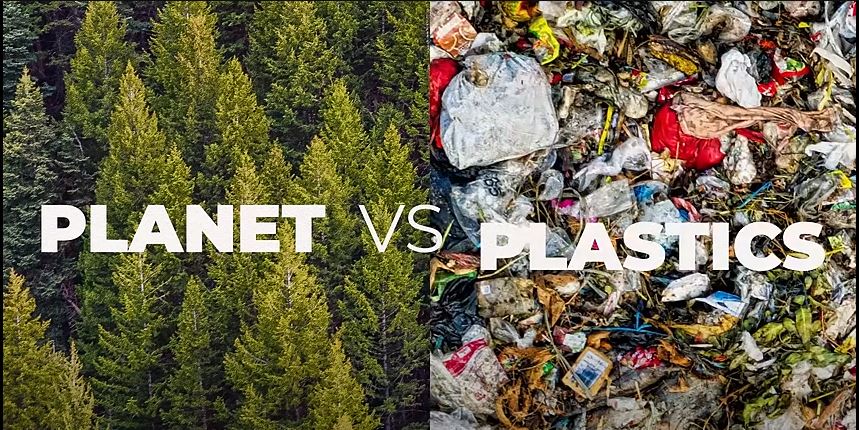
Planet vs Plastic -Confronting the Environmental Impact of Our Synthetic Dependency
As we gear up to commemorate Earth Day, the theme of “Planet vs. Plastic” takes center stage, igniting conversations and catalyzing activities worldwide. Each year on April 22nd, Earth Day serves as a poignant reminder of our collective duty to preserve our planet for future generations. This year, the spotlight shines brightly on the imperative to combat plastic pollution, underscoring the pressing need for concerted global action to address one of the most formidable environmental challenges of our era.
Unlocking the Climate Conundrum: Plastic’s Hidden Impact
Plastic pollution threatens ecosystems, wildlife, and human health by contaminating rivers, seas, and landfills. It clogs ecosystems, harms marine life, and affects food systems. Plastic also contributes to greenhouse gas emissions, exacerbating the global climate crisis. Key findings from Center for International Environmental law (CIEL) report (Plastic & Climate: The Hidden Costs of a Plastic Plane (2019)- “By 2050, plastic production and incineration could emit 2.8 gigatons of CO2 per year, releasing as much emissions as 615 five-hundred-megawatt coal plants”. Understanding and mitigating this hidden impact is crucial for effective strategies to combat climate change and protect the planet for future generations.
Plastics-From Production to Pollution
Plastic production has skyrocketed since its invention in the early 20th century. Initially hailed as a revolutionary material, its low cost and durability quickly led to its widespread adoption. Today, plastic permeates nearly every aspect of modern life.
The journey of plastic from its inception to its eventual disposal is rife with environmental consequences, each step leaving an indelible mark on our planet. Beginning with the extraction and refinement of fossil fuels, the primary raw materials for plastic production, greenhouse gas emissions permeate the atmosphere, exacerbating climate change. The manufacturing process itself further compounds this impact, emitting vast quantities of pollutants into the air and water. Once in circulation, plastic items persist for centuries, gradually breaking down into microplastics that infiltrate ecosystems worldwide, posing a myriad of threats to wildlife and human health. This intricate web of production, consumption, and disposal underscores the urgent need for systemic change to mitigate the far-reaching environmental footprint of plastic. In 2019 alone, plastics’ manufacture and conversion from fossil fuels were responsible for a staggering 90% of the 1.8 billion metric tonnes of greenhouse gas emissions generated by the plastic industry. This translates to approximately 3.4% of all global emissions, a figure that underscores the substantial environmental impact of plastic production (UNEP).
Despite efforts to mitigate its effects, the volume of plastic production continues to climb steadily. From 218 million metric tonnes in 2005 to 369 million in 2021, the trajectory remains upward, albeit at a somewhat slower pace. These figures, reported by UNCTAD, highlight the persistent growth of the plastic industry and its enduring contribution to climate change.
Moreover, the repercussions of plastic pollution extend far beyond environmental degradation. Ecosystems, crucial for regulating climate and supporting biodiversity, are increasingly burdened by plastic waste, hindering their ability to adapt to changing environmental conditions. Habitats and natural processes are disrupted, exacerbating the vulnerability of already-threatened species.
Like many countries, Kenya has long struggled with plastic waste, which dots its Indian Ocean coast and often abounds in its lakes. Kenya plastic pact (KPP)reports that, the country generates 22,000 tonnes of waste daily, with 20% of it being plastic. Daily plastic consumption 0.03 kg per person and annual plastic waste 0.5-1.3 million tonnes, with only 8% being recycled.
Gendered Burdens: How Plastic Pollution Disproportionately Affects Women
Women are disproportionately affected by plastic pollution, as they are often first to address its negative effects in their communities. They are more directly impacted by ecological changes (UNEP/PP/INC.1/7), which affect their access to clean water, food security, and overall well-being. Women’s exposure to harmful chemicals and their role in caregiving and reproductive health heighten their vulnerability to the health impacts of plastic pollution. Addressing the gender dynamics in the plastic crisis is essential for creating effective solutions that promote gender equality and empower women to lead resilient and sustainable communities.
Charting a Course for Change: Solutions to Combat Plastic Pollution
Amidst the escalating crisis of plastic pollution, there is a growing recognition of the urgent need for concerted action to mitigate its far-reaching impacts. Fortunately, a range of solutions exists to address this pressing challenge, offering hope for a more sustainable future. One crucial approach involves reducing plastic consumption and reliance through initiatives such as single-use plastic bans, incentivizing reusable alternatives, and promoting eco-friendly packaging. Additionally, investing in innovative technologies for plastic recycling and waste management infrastructure can help minimize the accumulation of plastic waste in the environment (OECD-Towards eliminating plastic pollution). Moreover, fostering public awareness and engagement through education campaigns and community initiatives is essential for cultivating a culture of responsible consumption and waste reduction. By implementing these multifaceted solutions and working collaboratively across sectors, we can chart a course towards a cleaner, healthier planet for current and future generations (https://doi.org/10.1016/j.envint.2020.106067).
And as a step forward, at INC-2 and INC-3 UNEP sessions, world leaders endorsed a resolution to end plastic pollution, emphasizing international collaboration and knowledge sharing to address the entire plastic lifecycle.
In conclusion, the environmental impact of our synthetic dependency is undeniable, but it is not insurmountable. By acknowledging the problem and taking decisive action, we can mitigate the effects of plastic pollution and pave the way for a more sustainable future. Whether through policy reform, technological innovation, or individual lifestyle changes, each of us has a role to play in protecting our planet from the scourge of plastic. Together, we can confront the challenge and safeguard the health and vitality of our precious Earth for generations to come.
Written by Wilver Ongoro
© Acumed4d 2024